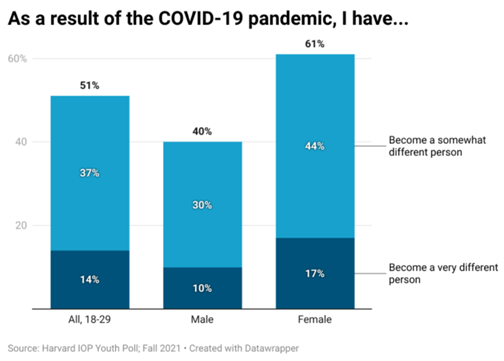The Daily Escape:

View from Franconia Notch, NH – November 29, 2021 photo by Mel Elam. Looks cold.
There’s plenty of Covid news. We’re concerned about the new Omicron variant while we’re also seeing another surge of the Delta variant around the country. It’s important to remember that half of what you’re reading about Omicron now, and for the next several weeks, is going to be wrong or mistaken.
The problem is that we can’t be sure which half is wrong.
It’s troubling how prevalent Long Covid has become. The NIH reported on an Italian study that found 87% of people recovered and discharged from hospitals showed at least one symptom even 60 days after release. The commonly reported problems were fatigue (53.1%), worsened quality of life (44.1%), shortness of breath (43.4%), joint pain, (27.3%) and chest pain (21.7%).
One symptom of Long Covid that wasn’t reported is emotional distress. This is particularly evident in younger Americans. The just-released Fall 2021 Harvard Youth Poll, surveyed 2,109 Americans aged 18-29, between October 26 and November 8. In addition to their usual questions about politics, they also asked these young Americans about their mental health and Covid. They found that half of them say they’re a different person because of Covid. Here are the results:

Overall, 51% of 18-29-year-olds say that Covid has changed them. What’s particularly striking is that 61% of young women say they’re different now than they were before Covid. Contrast that with men in the survey, just 40% of whom said that they have changed.
While the survey can’t tell us exactly how they’ve changed, there’s some insight because 51% also say that Covid had a negative impact on their life. And there wasn’t a partisan divide: 51% of Democrats, 51% of Republicans, and 52% of independents said that Covid impacted them negatively.
There’s something worse going on though. These kids are a mess mentally. More than half (51%) report that several times in the last two weeks they felt down, depressed, and hopeless, while 25% have had thoughts of self-harm.
In addition to the majority of youth who express depressive symptoms, and the 25% who express thoughts of self-harm, the study also found that a significant number show traits associated with generalized anxiety disorder:
- 38% of young Americans report feeling nervous, anxious, or on edge in the last two weeks
- 36% have been worrying too much about different things
- 32% have been easily annoyed or irritable
- 30% have had trouble relaxing
- 22% report feeling afraid, as if something awful might happen
- 20% have not been able to stop or control worrying
- 16% have been so restless that it is hard to sit still
The causes of these emotional problems are diverse. The respondents listed the following as their top five reasons for worry: School or work (34%), personal relationships (29%), self-image (27%), economic concerns (25%), and Covid (24%).
But Covid can easily be seen as the primary driver behind all of these issues. The pandemic brought fear of losing one’s own life or that of an older loved one. The lockdowns impacted school and work, with people having to use technology as a work around for face to face interaction. People were cut off from friends and family. Dating died. Retail businesses that primarily hire the young closed, or sharply reduced their staffing, causing historic job losses and reduced paychecks.
The CDC reported in 2020, that from 2007 to 2018, the suicide rate among persons aged 10–24 had increased 57.4%. Let’s hope that isn’t what will happen to this cohort going forward.
Wrongo and Ms. Right have 12 grandchildren. Ten are between 18-29. A few graduated from high school, college, and grad school during the pandemic. And some of those graduates seem stuck in bad grooves, unable to land the jobs they wanted, or in some cases, a job at all.
They seem to swing between two poles, either feeling unqualified for the job they want, or being unwilling to settle for the jobs they are offered. A few grandchildren with college degrees say they are unqualified for even entry-level positions in their field of study.
These kids broadly represent what the kids in the Harvard study say about changes in their lives during Covid. Young Americans must really hate what we’ve done to them.
Their sense of despair is a common theme in other polling of American adults. But the deep unhappiness and pessimism displayed in the Harvard poll was a startling turn in an age group that might be expected to have more optimism, given that they are at such an early stage of their adult lives.

How do we…or the young adults surveyed….sort out the effects of Covid from the effects of America’s mood generally? There are just too many factors in current American culture that dampen optimism, to put it lightly. I have often said about my youthful upbringing in post-WWII Detroit that it was a great time and place to grow up: optimistic, sky’s-the-limit expansion of opportunity and growth, pride in what America had done and surely could do again, the shear joy of accomplishment, united-we-can communitarianism. We seem to be living in a very different time, Covid or no Covid. Sure Covid has been and still is a downer, but it just cannot be entirely responsible for the depressive effects reported by young people. I speculate that kids growing up in postwar Detroit would have toughed it out with a whole different spirit. (At least the white, middle-class kids.)